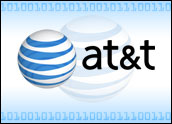
AT&T on Thursday changed the way it handles the cellular data use of its unlimited wireless data users.
Customers with unlimited data plans for 3G and non-LTE 4G smartphones will see their wireless speeds slow once they user more than 3GB of data per month. Those using an unlimited plan on a 4G LTE smartphone have a 5GB threshold before they see their speeds slow.
Previously, AT&T had told customers only that the top 5 percent of unlimited data users would be throttled. The company maintains that using approximately 3GB of cellular data per month would likely put a customer in the top 5 percent of its wireless users, but the newly spelled-out guidelines place a hard limit on the amount one may use before seeing slow speeds.
After the month’s billing cycle is up, the user will start fresh and speeds will return to normal.
Customers under the tiered plans will not be affected by the new policy. The highest tier AT&T offers is 3GB of data for $30 per month. A customer under that plan would pay for additional usage if he or she used more than 3GB in a month but would not experience slower data after crossing that threshold.
Any user nearing the threshold will receive a text message alert from AT&T.
Limited Spectrum
With smartphone use on the rise, AT&T joins other carriers in exploring new ways to limit the amount of data that consumers use. Since 2006, AT&T’s smartphone customer list has grown from 7 million to 39.4 million. During that time, it’s invested more than US$95 billion in expanding its networks, the company claims, and it plans to put another $20 billion into wireless during 2012.
Verizon, the largest wireless provider in the U.S., also throttles the top 5 percent of its users. Sprint is the only of the three largest U.S. networks to still offer a truly unlimited plan.
AT&T is urging consumers to use WiFi, which does not count toward their monthly cellular data limits, as often as possible.
“Spectrum is a very limited resource, and it’s a shared resource, and we have to find a way to manage the network so that all customers can use it and still have a great experience,” Mark Siegel, executive director of media relations at ATT Mobility, told the E-Commerce Times.
During its ultimately fruitless bid to acquire T-Mobile, the fourth-largest carrier in the U.S., AT&T frequently insisted it needed the merger for the additional spectrum T-Mobile could bring to the table.
“AT&T was the first carrier to handle the iPhone and is certainly paying the price,” Dan Olds, principal analyst at Gabriel Consulting Group, told the E-Commerce Times. “I don’t think they had any idea just how quickly this phone would take off and how voraciously consumers would be using AT&T’s network to shuttle data back and forth.”
Consumer Reaction
Despite the spectrum crunch, many consumers have become accustomed to “unlimited” access to data.
“Customers aren’t going to be very happy with this move, even though, as AT&T continually points out, this only affects a limited number of them. Of course, it’s not that they can’t get an unlimited amount of data — it’s that AT&T will, if they exceed their quota, knock their speeds down a few notches,” said Olds.
AT&T customers do have the alternative to switch to a tiered data plan that won’t hinder their speed, but will instead charge them more for extended use. Customers who find neither option attractive may decide to walk away from AT&T altogether, but from the carrier’s point of view, losing heavy users who didn’t pay as much as their peers may be a net positive.
“Consumers are definitely going to see more limits on their data usage. Usage is growing faster than capacity and technical advances that allow the firms to get more traffic through their existing capacity. Metered Internet usage is coming down the road, so customers will need to get used to it,” said Olds.





















































Social Media
See all Social Media